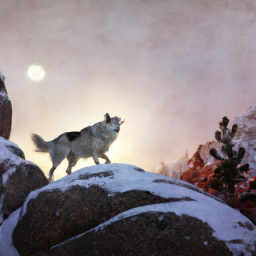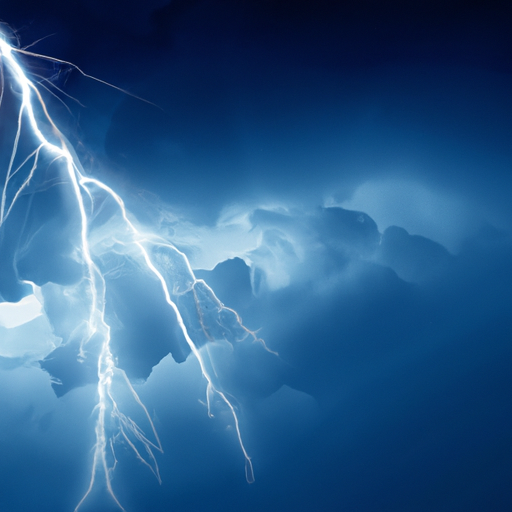In the realm of art and literature, the wolf has long served as a powerful symbol, representing strength, courage, and the human experience. From ancient times to modern day, this majestic creature has captivated our imaginations and inspired countless works of poetry. Whether depicting the lone wolf’s solitude, the bond between humans and wolves, or the primal nature within us all, these impactful wolf poems offer a window into our connection to nature and the depths of our emotions. From haunting haikus to thought-provoking verses, explore our collection of over 27 meaningful wolf poems and let their howls echo within your soul.
Lone Wolf Poem Collection
The Lone Wolf Poem Collection is a compilation of poetic works that explore the enigmatic and captivating nature of the wolf. Wolves have long been revered and symbolized various qualities such as strength, courage, and perseverance. However, they also embody themes of loneliness, struggle, and desperation. Through the lens of poetry, we delve into the multifaceted world of the lone wolf, a creature separated from its pack, and contemplate the parallelism it holds with human experiences and our connection to nature.
The White Wolf
Amenlien Fox’s poem, “The White Wolf,” delves into the thoughts and emotions of a solitary white wolf as it roams through a snowy landscape. The poem captures the essence of the white wolf’s isolation, portraying its departure from its pack and its haunting howls in the night. Through vivid imagery and lyrical prose, Fox invites readers to immerse themselves in the world of this majestic creature and experience the solitude it embodies.
The Last Wolf
Mary TallMountain’s “The Last Wolf” is a gripping poem that takes us on a journey through a ruined and abandoned city, where a lone wolf crosses paths with the speaker. The poem leaves room for interpretation, evoking a sense of mystery and contemplation. TallMountain’s deliberate vagueness allows readers to reflect on the deeper symbolism behind the encounter between the wolf and the speaker, highlighting the themes of isolation and longing.
A Wolf
Jorge Luis Borges’s poem, titled “A Wolf,” offers a poignant exploration of the last remaining wolf in America. The haunting poem follows the creature as it is hunted during the night, while the speaker mournfully observes its plight. Borges weaves together elements of nature, darkness, and loss, inviting readers to ponder the fragility of existence and the interconnectedness between humans and animals.
Classic Poems About A Wolf and a Person
In the realm of classic poetry, the dynamic between a wolf and a person often serves as a metaphor for struggle, existential battles, and unexpected connections. These poems depict encounters between individuals and wolves, both in literal and figurative senses, capturing the essence of this complex relationship.
The Wolf
Emily Pauline Johnson’s “The Wolf” is a harrowing poem that recounts the terror of a wolf attacking its prey. Through vivid descriptions, the poem immerses readers in the heart-wrenching experience, evoking a sense of helplessness and awe at the power of nature. Johnson’s skillful portrayal of the predator-prey relationship taps into primal emotions and serves as a reminder of the raw and untamed forces that surround us.
St. Francis and The Wolf
Katharine Tynan’s poem, “St. Francis and The Wolf,” tells the tale of a Saint and a wolf who form an unlikely bond. The wolf, driven by hunger and loneliness, finds solace in the presence of St. Francis, eventually becoming a regular visitor. Tynan’s poem explores themes of compassion, understanding, and the transformative power of empathy. Through this encounter, she challenges the traditional perception of wolves as ferocious beasts and emphasizes the importance of connection and kindness.
Wolf
Imru Al-Qays’s poem, aptly titled “Wolf,” takes readers on a journey alongside a distant, solitary wolf. The speaker travels alongside this enigmatic creature, observing its movements and drawing parallels between the wolf’s existence and the human experience. Al-Qays’s poem delves into themes of solitude, longing, and the inherent connection between humans and the natural world.
A Wolf in the Park
“A wolf in the park” is a poem that poses a simple but intriguing question: “Is there a wolf in the park?” The speaker contemplates the existence of this elusive creature, having never seen it but hearing its howl echoing through the night. The poem taps into the imagination and invites readers to consider the presence of untamed nature in unexpected places.
The Wolves
Elizabeth Madox Roberts’s poem, “The Wolves,” tells the haunting story of the speaker’s grandmother, who lived in an old cabin stalked by wolves. Roberts’s vivid descriptions and atmospheric language transport readers to a world where fear and danger lurk, highlighting the ever-present connection between humans and the wild. The poem reminds us of the primal instincts that lie within us and the delicate balance between civilization and the untamed.
Wolf Poems About the Human Experience
In these poems, the wolf serves as a metaphorical vehicle to capture and convey human experiences, emotions, and desires. By likening our own complex interior worlds to that of a wild wolf, these poems invite readers to explore the depths of our primal nature and embrace our rawest emotions.
Lone Wolf
Elizabeth Tyease Collins’s poem, “-lone Wolf-,” offers a glimpse into the mind of an individual consumed by an intense and predatory love for a woman. Through visceral language and vivid imagery, Collins delves into the depths of human emotions, comparing them to the instincts and characteristics of a wolf. This powerful poem serves as a reminder of the complexities and intensity of human connections.
Running Wolf
“Running Wolf” by Dave Alan Walker takes readers on a dreamlike journey where the speaker assumes the guise of a wolf living among Native Americans. This poem explores the idea of reincarnation, suggesting that humans may be the reincarnated souls of wolves. Walker’s poem prompts us to reflect on the interconnectedness of all living beings and our ancient ties to the natural world.
The Wolf Reader
“The Wolf Reader” is a captivating poem that draws parallels between the thrill of reading and the untamed nature of wolves. The poem explores how both activities tap into our primal instincts and transport us to realms beyond our immediate surroundings. By comparing the act of reading to the instinctive nature of wolves, the poem celebrates the transformative power of literature and the allure of the wild.
Wolf Cento
Simone Muench’s poem, “Wolf Cento,” takes readers on a poetic journey through the life of a wolf, offering a unique perspective on existence itself. The poem mirrors the structure of a cento, a poetic form composed of lines borrowed from other works. By piecing together fragments of various poems, Muench creates a mosaic of experiences, providing readers with a holistic and multisensory glimpse into the world of a wolf.
A Wolf Is at the Laundromat
In Jack Prelutsky’s whimsical poem, “A Wolf Is at the Laundromat,” the wolf appears in a very unexpected setting: a laundromat. The speaker finds themselves face-to-face with this unlikely encounter, highlighting the juxtaposition between the mundane and the wild. Prelutsky’s playful and imaginative poem invites readers to embrace the element of surprise and venture into uncharted territories of the imagination.
More Poems About Wolves
Wolves have long captivated artists, writers, and poets due to their beauty, symbolism, and enigmatic nature. These poems delve into various aspects of the wolf’s existence, weaving together themes of fear, freedom, isolation, and more. Each poem sheds light on different facets of the wolf’s mystique and invites readers to consider the profound impact these creatures have had on human consciousness.
The Wolves
Aleksey Tolstoy’s poem, “The Wolves,” portrays a pack of wolves hunting within a church village. As the poem unfolds, Tolstoy describes the members of the pack and the measures taken by the villagers to protect themselves. This classic poem strikes a balance between awe and fear, highlighting the innate power and inherent vulnerability of both humans and wolves.
The Last Wolf in Edmonson County
In Davis McCombs’s poignant poem, “The Last Wolf in Edmonson County,” the speaker reflects upon a natural landscape once inhabited by wolves. The poem serves as a tribute to a bygone era, capturing the nostalgia and hollowness felt when a vibrant part of nature is no longer present. McCombs’s evocative language allows readers to witness the impact of human interference on the delicate ecosystem that once supported these magnificent creatures.
Dear Wolf
Grace Fallow Norton’s poem, “Dear Wolf,” delves into the primal relationship between humans and wolves. With vivid imagery and evocative language, Norton explores the hunter-prey dynamic that exists between the two species. The poem challenges readers to consider the interconnectedness of all living beings and our shared place in the circle of life.
The Wolf at the Door
Ruth Hall’s quatrain, “The Wolf at the Door,” encapsulates the primal instinct to protect what is of value from potential threats. Through concise language and vivid imagery, Hall highlights the tension and fear that can arise when faced with imminent danger. The poem acts as a reminder of the vulnerability inherent in our existence and the innate need to guard and preserve what we hold dear.
A Night With A Wolf
Bayard Taylor’s poem, “A Night With A Wolf,” recounts a story that a speaker tells their child during a fierce storm. The speaker reflects on a night spent with a wolf, seeking refuge from the storm. Taylor’s poem explores themes of companionship, survival, and the potential for unexpected connections in the face of adversity.
Incident on the Road to the Capital
Dara Wier’s poem, “Incident on the Road to the Capital,” delves into the internal struggles and desires of a lone wolf seeking to break away from its wild counterparts. The poem offers insights into the wolf’s temperament, contrasting the wild and untamed nature of the creature with the speaker’s contemplations. Wier’s thought-provoking poem invites readers to consider the complexities of identity and the price of individuality.
Haiku Wolf Poems
Haikus, with their concise and sensory language, perfectly capture the essence of nature and lend themselves well to reflections on the wolf. These haikus evoke the atmosphere of moonlit nights, winter landscapes, and the elusive nature of the wolf, allowing readers to immerse themselves in the beauty and mystique of these creatures.
Wolf Moon
Liam McDaid’s haiku, “Wolf Moon,” speaks of the forgotten one who watches from the shadows, howling for love. With just a few carefully chosen words, the haiku encapsulates the longing and primal yearning that exists within the heart of a wolf.
Winter Wolf
Susan Ashley’s haiku, “Winter Wolf,” paints a serene picture of a snowy landscape where deer tracks disappear under the falling snow. The long gray wolf’s howl pierces the stillness, immersing readers in the peaceful and mesmerizing world of the winter forest.
The Moon
Amanda Moore’s haiku, titled “The Moon,” explores the relationship between the wolf and the moon. The speaker contemplates the unanswered howls of the wolf, emphasizing the unrequited desire and the eternal yearning embedded in the fabric of existence.
Night Winter Forest
In this haiku, titled “Night Winter Forest,” Slight Buckling captures the ethereal atmosphere of a winter forest at night. The wind rustles through the trees, snow covers the ground, and the wolf and rabbit exist in a moment of peace. The haiku invites readers to savor the quiet beauty of nature and find solace in the simplicity of a winter’s night.
Quotes About Wolves
Throughout history, wolves have inspired profound thoughts and reflections from various writers and thinkers. These quotes encapsulate the enduring fascination and respect humans hold for this majestic creature, shedding light on the ways in which wolves serve as both a reflection and an enigma of our own nature.
Virgil
Virgil, the esteemed Roman poet, reflects on the indifference of the wolf to the number of potential prey. This quote reminds us of the wolf’s inherent nature and its indifference to societal norms. The wolf embodies a primal instinct that remains unaffected by external influences.
George R. R. Martin
George R. R. Martin, renowned author of “A Song of Ice and Fire” series, draws a parallel between the howling wind and the presence of real wolves. This quote sets a vivid scene and evokes a sense of eerie ambiance while emphasizing the wildness and untamed allure of these creatures.
George R. R. Martin
In another quote, George R. R. Martin emphasizes the impossibility of truly taming a wolf. While an individual may attempt to befriend or control a wolf, it ultimately remains a wild and uncontrollable force of nature. This quote speaks to the untamed essence of the wolf and the futility of attempting to fully subdue its primal instincts.
Farley Mowat
Farley Mowat, a celebrated Canadian writer and naturalist, delves into the misconceptions surrounding wolves. He highlights how humans have projected their fears and misunderstandings onto these creatures, shaping a myth of savagery and ruthlessness. Mowat challenges us to reevaluate the way we perceive and relate to wolves, encouraging a deeper understanding and appreciation of their true nature.
In conclusion, the Lone Wolf Poem Collection offers a rich tapestry of poems that tap into the mystique and symbolism of wolves. Through this comprehensive compilation, we explore the themes of loneliness, struggle, and isolation embodied by the lone wolf. We also witness the transformative encounters between wolves and humans, highlighting the complexities of human emotions and the enduring connection we share with nature. From classic poems that examine the primal instincts of wolves to haikus that evoke the ethereal beauty of the natural world, each poem offers a unique perspective on the enigmatic and captivating nature of the wolf. By delving into these impactful and meaningful works, we gain a deeper understanding of ourselves, our connection to the natural world, and the profound impact that wolves have had on human consciousness.



